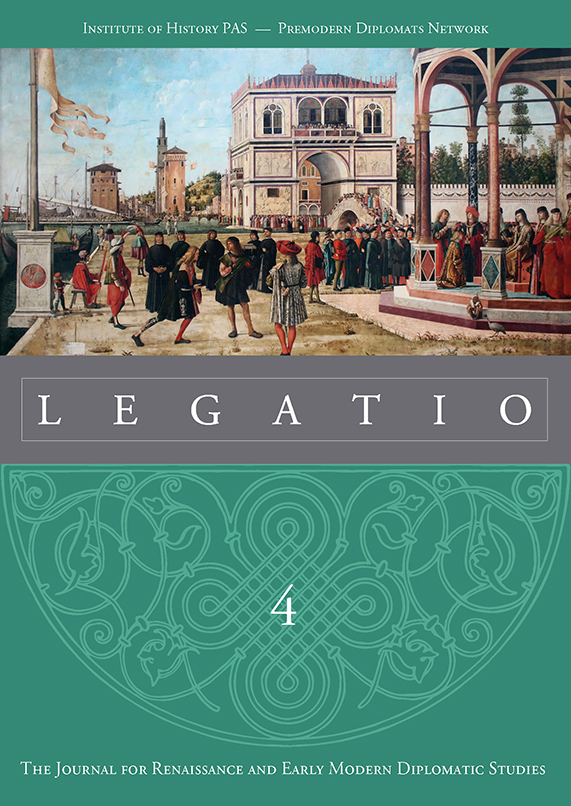The Education of an Ambassador: The Marquis d’Effiat in England (1624–25)
DOI:
https://doi.org/10.12775/LEGATIO.2020.03Keywords
Diplomatic training, early modern France, Louis XIII, career diplomat, Charles of England, Marquis d’Effiat, Henrietta-Maria, marriage negotiationsAbstract
When he left France in July 1624 to go to England, on young Louis XIII’s order, Antoine Coiffier de Ruzé, Marquis d’Effiat, began his very first diplomatic trip. Despite his functions, the Marquis d’Effiat never accomplished any diplomatic mission of any kind. However, a few years earlier, he negotiated the marriage of Honoré d’Albert, a Duke of Luynes’s brother. Thus, in 1624, he was entrusted with the delicate mission to bring England and France together through the marriage of Henrietta-Maria of France, the King’s sister, to Charles, Prince of Wales.
This is an extraordinary embassy and the dispatches of the ambassador have been preserved as well as the replies of Louis XIII and the Secretary of State, Antoine de Lomenie. This allows us to observe an evolution both in Effiat’s account of his actions and the content of the points negotiated, and the way his work was staged. Despite his age, the Marquis d’Effiat was new to diplomacy. He was familiar with the royal French court but his ignorance about England and diplomatic practices raises questions about the King’s choice of sending him across the Channel. This ignorance of diplomatic customs includes negotiation strategies, but also the body language that an ambassador must adopt to serve the interests of his master and extensively described in 16th century treatises on ambassadors. This article aims to compare the ambassador’s discourse with the diplomatic accomplishment. The interest of this embassy, besides its political and religious stakes, is that it makes it possible to observe its fears of error and procrastination through the correspondence of the marquis.
References
Archival Sources
Bibliothèque nationale de France
‘Ambassade du marquis d’Effiat (14 juillet 1624 – 28 décembre 1624) touchant au mariage de la princesse Henriette-Marie de France et du prince de Galles’, Fr. 15991
The National Archives, Kew, Richmond
State Papers 78/72 and 78/73
Printed Primary Sources
Castiglione, Baldassare, The Courtier (1528), trans. Thomas Hobby (London, 1566)
Hotman, Jean, The Ambassador (London, 1603)
Secondary Sources
Andretta, Stefano, Péquignot Stéphane, Waquet Jean-Claude (eds.), De l’ambassadeur: Les écrits relatifs à l’ambassadeur et à l’art de négocier du Moyen Âge au début du XIXe siècle (Roma: EFR, 2015)
Andretta, Stefano, Péquignot, Stéphane, Schaub, Marie-Christine, Waquet, Jean-Claude, Windler Christian, Paroles de négociateurs, l’entretien dans la pratique diplomatique de la fin du Moyen Âge a la fin du XIXe siècle (Roma: EFR, 2010)
Bély, Lucien, Espions et ambassadeurs au temps de Louis XIV (Paris: Fayard 1990)
Bély, Lucien, ‘La polémique autour de l’Ambassadeur de J. Hotman: culture et diplomatie au temps de la paix de Lyon’, Cahiers d’histoire, 46, no. 2 (2001), 327–54 (pp. 328–29)
Berridge, Geoff R., The Counter-Revolution in Diplomacy and other essays (London: Palgrave Macmillan, 2011)
Britland, Karen, ‘A Fairy-tale Marriage: Charles and Henrietta-Maria’s romance’, in The Spanish Match: Prince Charles’s Journey to Madrid, 1623, ed. by Alexander Samson (Farnham: Routledge, 2006), pp. 123–38
Bru, Thérèse, La Forest d’Armaillé, Solène de (eds), Matière à écrire: les échanges de correspondance du XVIIe au XIXe siècle (Saint-Denis: Presses Universitaires de Vincennes, 2017)
Coast, David, ‘Secrecy, Counsel and Public Opinion during the Spanish and French Matches’, in Stuart Marriage Diplomacy. Dynastic Politics in their European Context, 1604–1630, ed. by Valentina Caldari, Sara J. Wolfson, Tim Harris, Stephen Taylor, Andy Wood (Cornwall: The Boydell Press, 2018), p. 189–202
Cotteret, Jean-Marie, Gouverner c’est paraître (Paris: Presses Universitaires de France, 2002)
Dunn-Hensley, Susan, Anna of Denmark and Henrietta Maria. Virgins, Witches and Catholic Queens (New Haven: Palgrave Macmillan, 2017)
Haehl, Madeleine, Les affaires étrangères au temps de Richelieu. Le secrétariat d’État, les agents diplomatiques (1624–1642) (Bruxelles: Peter Lang, 2006)
Leferme-Falguières, Frédérique, Les courtisans: une société de spectacle sous l’Ancien Régime (Paris: Presses Universitaires de France, 2007)
Motte, Alice, ‘Antoine Ruzé d’Effiat (v. 1581–1632), surintendant des finances sous Louis XIII’ (unpublished master’s thesis, l’école des Chartes, 2009), http://theses. enc.sorbonne.fr/2009/motte (accessed 25 October 2020)
Muchembled, Robert, L’invention de l’homme moderne: sensibilités, mœurs et comportements collectifs sous l’ancien régime (Paris: Fayard, 1988)
Preto, Paolo, ‘L’ambassadeur vénitien: diplomate et “honorable espion”’, in Lucien Bély, L’invention de la diplomatie, Moyen Âge – Temps modernes (Paris: Presses Universitaires de France, 1998), pp. 151–66
Quester, Michael (ed.) Stuart Dynastic Policy and Religious Politics, 1621–1625 (Cambridge, 2009: Camden Society, 5th series, 34)
Sirantoine, Hélène, ‘La lettre diplomatique à la croisée des genres’, in Epistola 2. La lettre diplomatique: Écriture épistolaire et actes de la pratique dans l’Occident latin médiéval (Madrid: Casa de Velasquez, 2018), pp. 1–7
Smuts, R. Malcolm, ‘The French Match and Court Politics’, in Stuart Marriage Diplomacy. Dynastic Politics in their European Context, 1604–1630, ed. by Valentina Caldari, Sara J. Wolfson, Tim Harris, Stephen Taylor, Andy Wood (Cornwall: The Boydell Press, 2018), pp. 13–29
Vaquero, Stéphane, Baltasar Gracian, la civilité ou l’art de vivre en société (Paris: Presses Universitaires de France, 2009)
Downloads
Published
How to Cite
Issue
Section
Stats
Number of views and downloads: 278
Number of citations: 0



